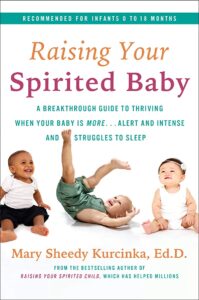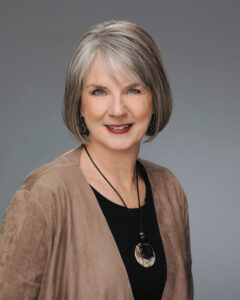Raising Your Spirited Baby by Mary Sheedy Kurcinka, Ed.D. (Book Excerpt)
 Excerpt from RAISING YOUR SPIRITED BABY by Mary Sheedy Kurcinka, Ed.D. Copyright © 2020 by Mary Sheedy Kurcinka. Used with permission by William Morrow, an imprint of HarperCollins Publishers. All rights reserved.
Excerpt from RAISING YOUR SPIRITED BABY by Mary Sheedy Kurcinka, Ed.D. Copyright © 2020 by Mary Sheedy Kurcinka. Used with permission by William Morrow, an imprint of HarperCollins Publishers. All rights reserved.
Chapter 3
What Do I Need to Stay Calm So I Can Calm My Baby?
Untangling Our Emotions, Reframing Our Experiences, and Getting Support
“If you start thinking negatively, like, ‘She’s driving me crazy,’ you’ll get frustrated. But if you think, ‘She isn’t settling because she’s smart and her mind is working very fast,’ it’s easier to stay calm. Well, maybe not in the middle of the night when she’s screaming and your partner is sleeping, but most of the time it helps.”—Teri, mother of three
It is not a figment of your imagination: You are working harder as the parent of a spirited infant. German researchers Mechthild Papousek, Michael Schieche, and Harald Wurmser document that the cues of spirited babies are more subtle and difficult to read. These babies truly can shift from fine to furious like an atom shooting through space. It is not easy to provide the warm, sensitive responses they need. In my experience with thousands of parents and babies, doing so requires regulation of your own arousal system.
If you are upset, neural static fogs your brain. A fogged brain misses cues and results in responses that tend to be too late and out of sync with your baby. That is why it is so important to give yourself permission to be compassionate to yourself. Taking care of you is taking care of your baby.
But how do you remain calm when exhaustion and worry threaten to take you down? Do you ask for help or struggle to manage this responsibility on your own? Do you search the internet for the right answer or respond from your heart? How do you find the strength to ignore what others insist worked for them but does not feel right for you, your baby, or your family?
The weight of fears and personal stress triggers can be crushing. But denying them prevents you from dealing with them. On the one hand you know you are not supposed to feel envious, but on the other, how do you help it when you see friends at a neighborhood gathering and their babies sleep in a stroller the entire time? If they complain, it requires every ounce of self-control not to yell, “You think you have it bad, but you have no idea!”
And then there is the embarrassing awareness that you have what feels like the worst kid in the group. Theirs are quiet. Yours fusses. Theirs sleep. Yours remains awake. That makes you worry. Do these parents know something you don’t?
Not even veteran parents escape the upheaval. Kristen, the mom of three, told me, “I knew it was going to be a lot of work. I’ve been through life with an infant before. But I definitely did not imagine this.”
Like Kristen’s, your love is enormous—and so are the demands on you. The disconnect between what we expect before the birth of a spirited baby and the reality we find ourselves in adds enormously to the stress. It’s as though someone gathered up our dreams and expectations, stuck a stick of dynamite in the bundle, and lit the fuse. Even if we were somewhat mentally prepared, it is still a shock.
UNTANGLING OUR EMOTIONS: THE CHALLENGES ARE REAL
In a social-media-filtered life where everything around you appears to be perfect, it is tempting to push yourself harder and slam shut the door so no one else finds out what’s going on. But doing so has a physiological impact.
Powering through your distress without addressing it pushes your arousal system into the red zone of threat and tension. Your heart rate accelerates. You can’t think clearly. And if that isn’t troubling enough, your baby synchronizes to your stress. The amount of crying and fussing escalates. The baby’s sleep fragments into twenty-minute catnaps. The turmoil snowballs.
It does not have to be this way. Amid the mayhem you have permission to stop and ask: “What helps me stay calm so I can calm my baby?”
Taking care of yourself is not being selfish or self-centered. When you calm your body, your baby calms as well. The question of course is how do we do it? I’ve been asking this question for decades. What I discovered is that the hardiest parents tell themselves two powerful messages that they return to over and over again:
- I can reframe and ultimately transform how I feel and think about this experience.
- I do not have to do it alone. I can ask for and get help. If you can develop and then hold on to these two powerful statements, you will discover a well of optimism you didn’t know you had and a wealth of possibilities that will support you in ways you never imagined possible.
WHAT AM I TELLING MYSELF? REFRAMING OUR BELIEFS AND SELF-TALK
What we tell ourselves about an experience changes that experience. It is not merely looking at the bright side or taking a grim view, but instead redefining the experience.
I was struck by this fact when my daughter moved to Europe for a job. Upon her arrival with four stuffed bags, a backpack, a bicycle, and downhill skis, she grabbed a cab and headed to the apartment she’d rented online. When she arrived, she found the key that had been left for her, opened the lobby door, and hauled all her baggage up the stairs to the fourth floor, only to discover the key did not unlock the door to her flat. She called the rental agency. No one answered. She searched for another key—found none. That is when she texted me to tell me what was happening. I wrote back, “It’s okay to cry.” She replied, “Nah, I’m in a safe place. The sun is shining. It’s 70 degrees. This is just an inconvenience. I’ll get a hotel tonight.”
Whatever the stresses we’re facing—whether we are locked out of our apartment or the new parents of a spirited baby—we can choose how we perceive and thus handle the experience.
There is actual science to explain how this process works. Lessons from neuroscience and psychology research conducted by Nikki Johnson and Catherine McMahon tell us when it comes to life with spirit, resilient parents manage to transform their perceptions from those in which everything is wrong to messages that explain, depersonalize, and redefine the situation. This change in perception has a physiological impact. It shifts the arousal system from the red zone of threat and tension to the green zone of calm energy.
In my spirited baby classes for parents we bring this experience to life. Recently, I kicked off a class by passing out blank cards, inviting parents to answer the question: “On the bad, awful, terrible days, what am I telling myself?”
I promised the parents anonymity. It took only a few minutes for everyone to complete the cards. I collected, shuffled, and passed them out, asking each parent to read one card.
Kristen, her hair still wet from a quickie shower, started us off:
- “I’m trapped. I don’t have help. It’s only me.”
The others followed:
- “I do not know what to do.”
- “I miss my mom. I’m so alone.”
- “UGH, just go the F**K to sleep!”
- “Why me?”
- “I want my old life back.”
- “I have the worst kid in the group.”
- “I can never do enough.”
As they read, I wrote the messages on the whiteboard, and then asked the group to read the list aloud. They refused. It was Jenna who broke the tension when she blurted, “I can’t. I’m going to cry.” Her comment triggered a visceral, collective reaction and an outpouring from the group.
The negative messages we tell ourselves are raw and oppressive. Our chests tighten, anxiety rises, our hearts pound. They shove us headlong into the red zone of overarousal. The impulse to flee rises in us, as does the question “What was I thinking when I had this kid?”
No one wants to feel this way. Fortunately, we don’t have to. We can make a conscious decision to alter how we think and feel about our experience as parents. This does not mean we deny our emotions. We still perceive them—the prickles of resentment, fear, and apprehension—and we accept them. We acknowledge we are human. We recognize this is a tough journey. But accepting our emotions does not mean we must give them control. It is within our power to choose what we will tell ourselves about them and how we will act.
 ABOUT THE AUTHOR
ABOUT THE AUTHOR
Mary Sheedy Kurcinka, Ed.D., is a bestselling author and internationally recognized lecturer and parent educator. Her books Raising Your Spirited Child, Raising Your Spirited Baby, Raising Your Spirited Child Workbook, Kids, Parents and Power Struggles and Sleepless in America: Is Your Child Misbehaving or Missing Sleep? Have been translated into more than twenty languages. A former director of one of Minnesota’s largest Early Childhood Family Education programs, Mary is the founder of the Spirited Child and Kids, Parents, and Power Struggles workshops. She resides in Bozeman, Montana, with her husband. Find out more at https://www.parentchildhelp.com.
Tags: children, family life, having kids, mary sheedy kurcinka, motherhood, parenting, raising your spirited baby















